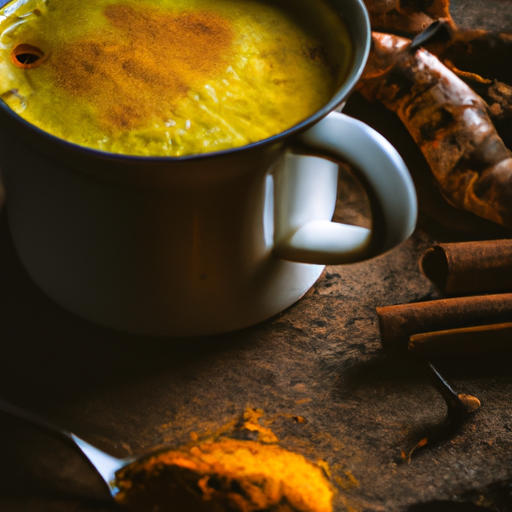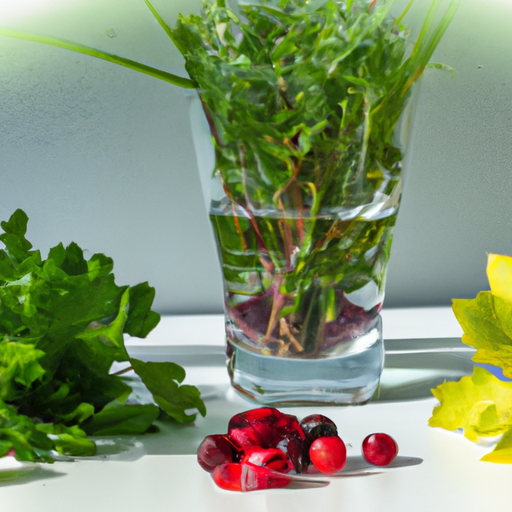As one who has dealt with gastritis, I understand the pain and frustration it can cause. Gastritis occurs when the stomach lining becomes inflamed, resulting in symptoms like stomach pain, bloating, nausea, and vomiting. While there are medications for gastritis, some opt for natural remedies instead.
One such remedy is turmeric, a spice with powerful anti-inflammatory properties. In this article, I will share with you everything I have learned about using turmeric for gastritis. I will explain what gastritis is and how it can be caused, as well as the health benefits of turmeric and how it can help alleviate symptoms of gastritis.
I will also provide tips on how to use turmeric in different ways and discuss the potential benefits and risks of using it for gastritis. By the end of this article, you will have a better understanding of how turmeric can be used as a natural remedy for gastritis and whether it’s right for you.
Key Takeaways
- Turmeric contains curcumin, which is an anti-inflammatory and antioxidant compound that can help with gastritis and other health issues.
- Turmeric is available in supplements, capsules, powders, and can be added to meals. The recommended dosage for curcumin supplements is 500-2000 mg per day.
- Other natural remedies like ginger, chamomile, and licorice root also have anti-inflammatory properties and can help soothe the stomach. Herbal teas can reduce stomach irritation, calm the stomach, and protect the stomach lining.
- Probiotics may help alleviate symptoms of gastritis by promoting a healthy gut microbiome. It is important to consult with a healthcare professional before starting any new supplements or dietary changes.
Understanding Gastritis and Its Symptoms
Gastritis can really ruin your day with its annoying symptoms like nausea and stomach pain. It’s a condition where the lining of the stomach becomes inflamed, causing discomfort and pain.
Several causes of gastritis include bacterial infections, excessive alcohol consumption, long-term use of nonsteroidal anti-inflammatory drugs (NSAIDs), and stress. Treatment of gastritis depends on the underlying cause. For instance, if the cause is a bacterial infection, antibiotics may be prescribed. If the cause is excessive alcohol consumption or the use of NSAIDs, it may be necessary to stop or reduce the intake.
Common symptoms of gastritis include abdominal pain, nausea, vomiting, bloating, and loss of appetite. If you experience any of these symptoms, it’s important to seek medical attention to determine the underlying cause of your gastritis.
Moving on to turmeric and its health benefits, this natural spice has been used for centuries as a remedy for various ailments, including digestive issues.
Turmeric and Its Health Benefits
An apple a day keeps the doctor away, but did you know that turmeric has numerous health benefits? Turmeric is a spice commonly used in Indian cooking and has been used in traditional medicine for centuries. It contains curcumin, a compound known for its anti-inflammatory and antioxidant properties. Studies have shown that curcumin can help with a variety of health issues, including reducing the risk of heart disease, improving brain function, and even potentially preventing certain types of cancer.
To highlight the potential health benefits of turmeric, take a look at this table:
| Health Benefit | Turmeric |
|---|---|
| Anti-inflammatory | ✔️ |
| Antioxidant | ✔️ |
| Heart Health | ✔️ |
| Brain Function | ✔️ |
| Cancer Prevention | ✔️ |
While turmeric is commonly used in Indian cooking, it can also be taken as a supplement. Turmeric supplements are available in various forms, including capsules and powders. Additionally, there are many turmeric recipes available online for those who want to incorporate it into their diet in a more flavorful way. In the next section, we will explore how to use turmeric specifically for the treatment of gastritis.
Ways to Use Turmeric for Gastritis
If you’re looking for a natural way to soothe your stomach and reduce inflammation, incorporating turmeric into your meals might be worth considering. Here are some ways to use turmeric for gastritis:
-
Add a pinch of turmeric to your soups or stews for a warm, comforting meal that promotes healing.
-
Make a turmeric tea by steeping turmeric powder in hot water with some honey and lemon for a soothing drink that can help alleviate symptoms.
-
Take turmeric supplements in capsule form to get a concentrated dose of the anti-inflammatory compound curcumin.
-
Mix turmeric with yogurt or honey and apply it topically to the abdomen to help reduce pain and inflammation.
These methods can be helpful in managing symptoms of gastritis, but it’s important to talk to your healthcare provider before using turmeric as a treatment option.
In the next section, we’ll explore the potential benefits and risks of using turmeric for gastritis.
Potential Benefits and Risks of Using Turmeric for Gastritis
You might be interested to know the potential benefits and risks of incorporating turmeric into your diet for managing stomach inflammation. Studies suggest that turmeric’s active compound, curcumin, has anti-inflammatory properties that may help alleviate symptoms of gastritis.
Turmeric can be consumed in various forms, such as in tea or as a spice in cooking, and the recommended dosage for curcumin supplements is typically between 500-2000 mg per day. However, it’s important to note that turmeric may interact with certain medications and may not be suitable for everyone, especially in high doses.
Additionally, turmeric may have some side effects, such as upset stomach, diarrhea, and allergic reactions in some individuals. It’s recommended to start with a small dosage and monitor any adverse effects before increasing the amount.
As with any supplement or natural remedy, it’s essential to consult with a healthcare professional before incorporating turmeric into your diet. Other natural remedies for gastritis include ginger, chamomile, and licorice root, which also have anti-inflammatory properties and can help soothe the stomach.
Other Natural Remedies for Gastritis
For those who prefer natural remedies, there are several options to consider when it comes to relieving the symptoms of gastritis. One popular option is to incorporate herbal teas into your diet.
Ginger tea, for example, has anti-inflammatory properties that can help reduce stomach irritation. Chamomile tea is also known for its soothing effects on the digestive system, which can help calm the stomach and reduce inflammation. Licorice root tea, on the other hand, has been shown to have a protective effect on the stomach lining, which is especially important for those with gastritis.
Another natural remedy that may be helpful for those with gastritis is probiotics. Probiotics are beneficial bacteria that live in the gut and help maintain a healthy balance of microorganisms.
In some cases, taking probiotic supplements or consuming probiotic-rich foods (such as yogurt or kefir) may help alleviate symptoms of gastritis by promoting a healthy gut microbiome. However, it’s important to note that not all probiotics are created equal, and some strains may be more effective than others.
As always, it’s best to consult with a healthcare professional before starting any new supplements or dietary changes.
Frequently Asked Questions
Can turmeric completely cure gastritis?
As a healthcare professional, I cannot guarantee that turmeric can completely cure gastritis. Turmeric controversies exist and alternative remedies should not replace medical treatment. Consult with your doctor before using turmeric for any health condition.
How long does it take for turmeric to show results in treating gastritis?
I started taking turmeric supplements for my gastritis and noticed improvement within a week. The recommended dosage is 500mg to 2g per day. Turmeric’s anti-inflammatory properties may benefit gastritis, but consult your doctor first.
Is it safe to consume turmeric in high doses for gastritis treatment?
It is not recommended to consume high doses of turmeric for gastritis treatment due to safety concerns. Dosage guidelines suggest no more than 500mg of curcumin per day. Always consult a healthcare professional before use.
Can turmeric interact with other medications used for gastritis?
When taking turmeric for gastritis, it’s important to be aware of potential drug interactions. Always speak with your healthcare provider before starting any new supplement, and mention any medications you are currently taking.
Are there any specific dietary changes that need to be made while using turmeric for gastritis?
To alleviate gastritis symptoms while using turmeric, I made dietary adjustments such as avoiding spicy foods and consuming more fiber. I also prepared turmeric by mixing it with honey and warm water before ingesting.
Conclusion
In conclusion, using turmeric for gastritis has shown promising results in relieving symptoms such as abdominal pain and inflammation. As someone who’s suffered from gastritis, I highly recommend giving turmeric a try.
However, it’s important to note that some individuals may experience side effects such as nausea or stomach upset. It’s also important to consult with a healthcare professional before incorporating turmeric into your diet.
One anticipated objection to using turmeric is the taste. Some may find the flavor too strong or bitter. However, there are various ways to incorporate turmeric into your diet such as adding it to smoothies, soups, or curries. Additionally, there are turmeric supplements available in pill form for those who aren’t fond of the taste.
Despite any hesitations, the potential benefits of using turmeric for gastritis make it worth considering as a natural remedy.










